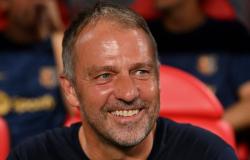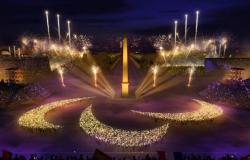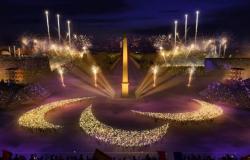On the eve of the Paris Paralympicsthe world has become aware of a story that Run had told you in 2020. That of Valentina Petrilloa visually impaired sprinter who will compete in the 400 and 200 m at the Stade de France. The same distance as his lifelong idol, Peter Mennea.
Whether Petrillo will be able to emulate her myth, we don’t know yet. But even before getting on the blocks, Valentina has made a bit of history. Valentina Petrillo, in fact, will be the first transgender athlete registered for the Paralympics.
We met her in 2020, when she was the first Italian athlete to compete in the category of her perceived gender. With the controversy that came with it. But in full compliance with the regulations imposed at national and international level.

International legislation
The fastest in the race for inclusion were the International Olympic Committee (in 2015) and World Para Athletics (in 2018) who, after years of research by a pool of experts led by Canadian Joanna Harper, set the parameter for the eligibility of MtF (male to female) trans athletes at 12 continuous months with a certified testosterone concentration of less than 5 nmol/L.
At the end of 2019 also the Fispes (Italian Federation of Paralympic and Experimental Sports) adopted the regulation published in the meantime by World Athletics in October 2019. Since then, however, each sports federation has adopted different criteria regarding the participation of trans athletes in competitions.
Below is an excerpt from the interview with Francesca Granapublished on Run of October 2020.
Valentina Petrillo, always sporty
«I was born in Naples in 1973 but at 20 I moved to Bologna to study computer science at the Francesco Cavazza Institute for the Blind. At 14, in fact, I had to deal with the first symptoms of Stargardt syndrome, a hereditary degeneration of the macula».
«Among friends and classmates I was famous for my speed and from the moment I saw Mennea triumph at the Moscow Olympics, athletics was a revelation».
«After a period in Milan, where I dedicated myself to five-a-side football and saw the World Championships for the visually impaired in Seoul fade away due to a knee injury, I returned to Bologna and athletics, winning 11 Italian Fispes titles in the space of 3 years. At that point, however, something in me had changed forever».
The Year of Awareness
“In October 2017, Fabrizio’s last race took place. And I did it only out of loyalty to my team, for which the Italian corporate championships were important. Fabrizio, however, showed up at the start with his paint on. A small gesture to affirm that that was no longer the right place for me.”
“In January 2018 I started hormone therapy and within a month, athletically speaking, I transformed: I gained 10 kg and felt without energy, I always had pain all over. To a certain extent I was doing violence to my body, but in my head I had never felt freer.”
“In the meantime, the coach struggles to look me in the face. He follows me less and I feel that the relationship is no longer equal. To feel calm again, it’s better to change coach and club. I join Polisportiva Pontevecchio Bologna, which respects me and gives me a locker room all to myself: a few square meters that protected my being. Sometimes I think that my illness is a stroke of luck: I can’t see well and I can ignore people’s looks.”
You like to win easy
“The insinuation that weighs most on me is that I took this path to win more easily. Beyond the disarming superficiality, I remember that I had already won 11 Italian Fispes titles before starting the transition.”
«The side effects of hormone therapy are incontrovertible: eight tenths lost in the 100 m, over a second and a half in the 200 m, 12” in the 400 m, not to mention the contraction of muscle mass».
“Sport is an absolutely sexist world: you are judged based on your body and there seems to be no way out of the binary classification of man/woman. It is legitimate that my opponents have doubts, but it is good that they know that I respect all the established limits”.
“I’m a natural competitor and I’ve always wanted to excel in everything. Suddenly, however, I wouldn’t have minded coming in second and finding my way paved by another trans athlete who was recognized as having the right to compete. Italy needs more culture, not just sports culture.”
“Beyond the victories, the only time I made anyone celebrate was when Fispes made it official that I, Valentina, could regularly compete in the women’s category. My transition was not a choice of courage, but of necessity.”
The players called up for the 2024 Paralympics
There are 15 Italian athletes called up for the Paris Paralympics, scheduled from 28th August to 8th September 2024. Seven women and eight men: Assunta Legnante in shot put and discus throw F11, Martina Caironi in the 100 and long jump T63, Amber Sabatini nei 100 T63,
Monica Contrafatto nei 100 T63, Valentina Petrillo in the 200 and 400 T12, Juliana Chiara Philippi in the 100 and long jump T64, Arjola Dedaj in the 100 and long jump T11 (with the guide Alessandro Galbiati), Maxcel Love Manu here 100 to 200 T64, Mark Cicchetti in the 100 and long jump T44,
Joseph Campoccio in the shot put and javelin throw F33, Ndiaga Dieng nei 400 and 1500 T20, Oney Tapia in discus throw and shot put F11, Fabio Bottazzini here 100 e 200 T64, Rigivan Ganeshamoorthy in the discus throw and javelin throw F52, Francesco Loragno now 100 e 200 T64.






